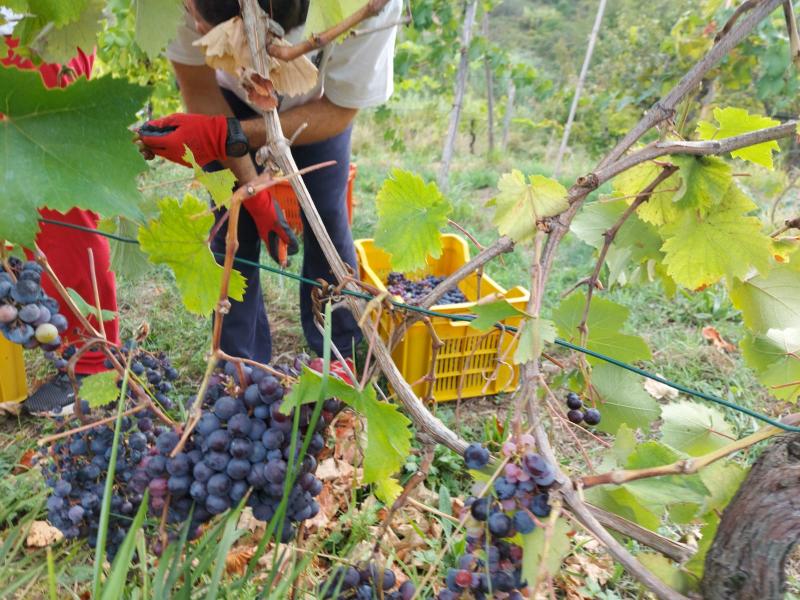“Tuscany” and “wine” are almost synonymous at times, and in the collective imagination, it’s usually Chianti that springs to mind first. But up north, near the Ligurian border, winemaking traditions in the province of Lucca have been documented since at least the 15th century. Workers have been cultivating and collecting grapes since even before then, and the vendemmia — the harvest — has long been an activity that binds families and communities together.
I grew up in a village amid the rolling hills of Lucca whose name derives from the Italian adjective for "dry". Here, the art of grape harvesting, more than any holiday or celebration, is the quintessential familial ritual. Multiple generations gather and work hand-in-hand to create a local, truly organic nectar to be served at the everyday dining table, alongside homemade bread and olive oil.
Until recently, my grandfather was the one in charge of determining the right time to start picking up the grapes and separating the bunches from their stems. Now my father's turn has come.
A vendemmia morning

It’s an early morning in September when we set off to the nearby fields, the morning breeze fading away, making room for a steaming hot Sunday. We’d prepared a huge Moka pot of coffee, but everyone had to drink it hastily before the heat came — there was no time to dawdle. Once we make our way to the vines, it’s time to search for a good pair of scissors and thick plastic gloves. That ritual always resembles a game of hide-and-seek, and the best pairs, per usual, have already been taken by those who left home with the earliest hints of morning sunshine.
I make my way down the hill, walking through olive trees and fruit plants. The leaves start creaking a little under my heavy boots. As always, we start from the bottom of the slope and, row after row, we make our way up to cellars.
“Nella botte piccola ci sta il vino buono,” my grandfather used to encourage me when I was complaining about being the shortest among my siblings. The small barrel holds the good wine. (Somehow the English proverbial equivalent of “good things come in small packages” doesn’t have quite the same ring to it.) The memory of his words always reminds me that during the vendemmia, it doesn’t matter how many kilos or tons of grapes you collect, as long as their shape and color are just right.
The vendemmia is primarily a family event, but it also involves friends and the wider community. “This year, extreme temperatures have affected our routines and we’ve had to start the collection earlier in the season,” says Aldo, our expert local winemaker, adding with a smile: “What a nice bunch of people turned up to help us today!”
“Bunches” of people are a bit out of the ordinary around here, except during harvest time, anyway. The village of Arsina is becoming increasingly quiet as younger generations head to larger cities for work opportunities; indeed, only two hundred souls — mostly retirees and a few northern European newcomers — reside in this green patch of heaven on the Lucca outskirts. But during the harvest, the vibe is different: Everyone’s back home, and neighbors drop by and make the usual small talk, though the questions are more about grapes than grandkids: “When will you start collecting?” “How is your vineyard this year?”
Small production, big rewards

In this part of Tuscany, there is no extensive or industrial wine production. Wine is produced in small quantities, meant to be sipped during family celebrations or gatherings. During the days of the vendemmia, people who come to help are rewarded with a bottle or two, as a token for their hard work.
Today, the division of tasks during the vendemmia still follows the old style. Young and adult family members cut and collect the bunches on large white bigoncie (their elongated, truncated cone shape helps grape mashing go smoothly). In past years, those containers were carried up the hill on one’s shoulders. But thankfully, unlike when I was a little kid, these days a small tractor — kindly loaned to us by our neighbor, Felice — picks up and hauls the bigoncie.
Grape processing begins straight away, but it’ll be at least two months before we can drink even a cup. Waiting and hoping that this year’s wine is tastier than last year’s is also part of the family tradition.

Join a vendemmia day
The platform Workaway provides hundreds of options for those who want to learn more about Tuscan agricultural traditions, breathe in pure air, and detox from city life.
Where can I stay?
Lucca’s countryside offers the perfect setting for enjoying peaceful family time and tainge a deep dive into the local culture. Fattoria Sardi is one of the Lucca area's historical family wineries, owned and managed by a young couple who follow biodynamic agricultural protocols. They produce rosé, white and red wines associated with the terroir lucchese.













